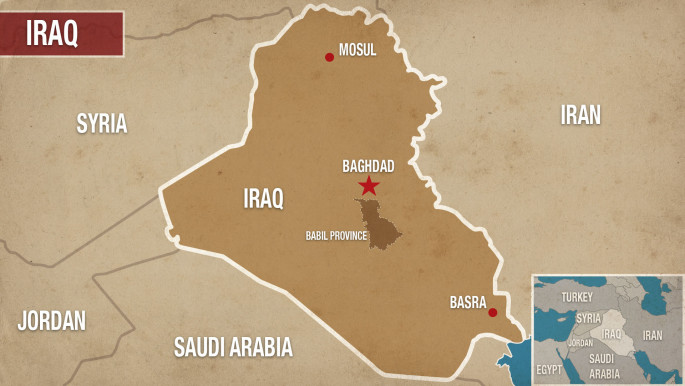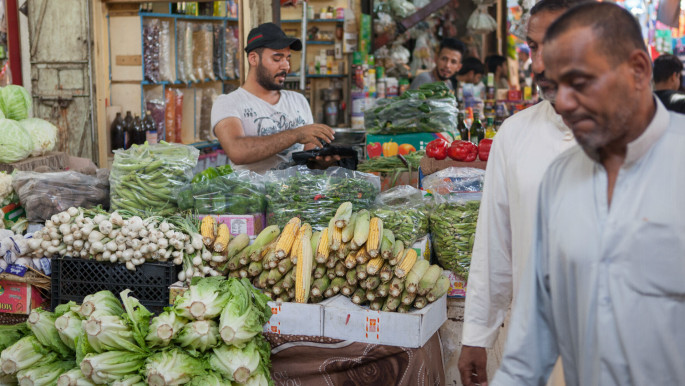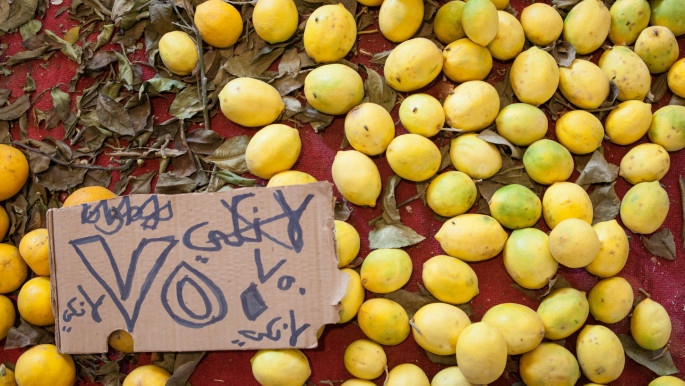Iranian imports overtake local produce in Iraq's Basra
"Iraqi tomatoes? Only in your dreams!" says his colleague, Ali Nibras, mockingly.
Most Iraqi families interviewed by The New Arab in Basra believe that the vegetables cultivated locally are fresher than those imported.
Strolling around, Mohammed Mahmoud looks for potatoes with the 'Made in Iraq' label to use for dinner tonight.
"It is expensive, but I will still buy Iraqi produce because it tastes a lot better," he says.
On the day The New Arab visited Basra's central market, one kilogramme of Iranian tomatoes were being offered at $0.40 per kilogramme, versus $1.20 for the Iraqi ones. Local sources, however, point out that prices vary day to day, depending on the volume made available to Iraqi traders by Iranian farmers.
"I always feel disappointed to see Iraqi products replaced by imports," says Mahmoud's friend, calling for the market to be revitalised with local foods.
However, importers claim that cheap food offers consumers more purchasing power. Left with no choice, countless low-income families have resigned to buying imported food products.
"What other options do I have?" asks 34-year-old father Haidar Ali who is out doing his weekly shop.
 |
|
| Basra is an Iraqi city located on the Shatt al-Arab between Kuwait and Iran |
Large-scale imports
According to Naeem Sabah, dean of the Department of Economy at the University of Basra, the large-scale imports of food products from neighbouring countries, mainly Iran, have led to the collapse of the economy in the city.
"Iraqi farmers can't compete with foreign goods that enter Iraq every day," he tells The New Arab.
Following the 2003 US-led invasion of Iraq, the country became largely dependent on food imports.
"Basra became a consumer city. More than 90 percent of our goods are imported, mostly from Iran," says Sabah.
According to the Regional Food Security Analysis Network, agricultural production dropped by another 40 percent after the invasion of the Islamic State group in 2014, making the situation even worse.
The Food and Agriculture Organization (FAO) forecasts that Iraq will be dependent on imports to meet its domestic food demand for many years to come.
 |
|
|
Iraqi customers at a fruit and vegetable market in central Basra [Sebastian Castelier] |
A local businessman had attempted to launch a dairy factory in Basra in 2012, but food traders and local politicians blocked the project, worried it would affect the Iran-Iraq cross-border business.
"Several Iraqi politicians have direct interests with neighbouring countries to the extent that it negatively affects the local economy," Sabah revealed.
Large-scale protests erupted throughout the summer denouncing the lack of access to basic services such as clean water and electricity.
"Iraqi officials sold the country to Iran, and local farming is now over," protesters shouted.
Read more here: The Iraq Report: Basra's fury erupts anew as protesters killed
Crumbling agriculture sector
Beyond the prevalence of imported foods on the shelves of Basra's markets, an agricultural sector on the brink of collapse is the other half of the overall issue.
Alaa Al Badran, a Basra-based private Agricultural Consultant, believes that Iraqi farmers can't meet the local needs and dominate Basra's shop shelves.
The United States Agency for International Development (USAID) reported that Iraq's agriculture sector had declined considerably during the last few decades due to the lack of investment, isolation from the global economy and counterproductive agricultural policies.
Once a water-rich country, Iraq now faces its worst water crisis since 1931. Water levels in major rivers have been reduced by 40 percent, rainfall halved and soil salinity has increased dramatically.
Read also: Cholera outbreak feared in Basra as water crisis affects 100,000
A United Nations' Environment Programme report states that Iraq loses 250 square kilometres of arable land every year.
 |
|
| Lemons being sold in a a food market in central Basra [Sebastian Castelier] |
"Neither the farmers nor the government have sufficient financial resources to invest in new technologies and develop efficient irrigation methods," Iraqi Minister of Water Resources Hassan Al-Janabi told The New Arab in July 2018.
In the alleys of Basra's vegetable market, Salim, 30, a seller, believes that the government should support farmers with funds, seeds, and modern water systems.
"They fight corruption and forget to care about agriculture," he says.
Majid Mozan, Head of the Basra Chamber of Commerce, says that support for local production has been long expected.
"Before 2003, our food was produced in Iraq, so solutions to support the national agriculture do exist," Mozan tells The New Arab.
However, for now, locals like Mohammed Mahmoud will just have to make do with the current situation.
After roaming around dozens of food stalls, Mahmoud has found his Iraqi potatoes. Despite paying double the price for them, he is still all smiles.
"I'm heading back home," he says. "My wife will be pleased with the purchase."
Sebastian Castelier is a journalist specialising in Iraq and the Gulf. Follow him on Twitter: @SCastelier
Azhar Al-Rubaie is an independent journalist based in Iraq. Follow him on Twitter: @AzherRubaie
![Basra food [Sebastian Castelier and Azhar Al-Rubaie] Basra food [Sebastian Castelier and Azhar Al-Rubaie]](/sites/default/files/styles/image_345x195/public/media/images/7034F544-7C3A-4E96-928C-EDF4BD58257B.jpg?h=d1cb525d&itok=M-NViXwl)




 Follow the Middle East's top stories in English at The New Arab on Google News
Follow the Middle East's top stories in English at The New Arab on Google News


